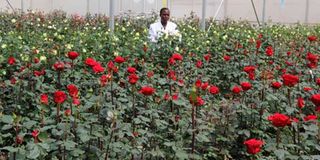EU must be fair during EPAs negotiations

Flowers in a greenhouse at Preesman, a flower breeding farm at Njoro, Nakuru County. The East African Community (EAC) has requested an urgent meeting with the European Union (EU) to finalise outstanding issues in trade negotiations. PHOTO | SULEIMAN MBATIAH | NATION MEDIA GROUP
What you need to know:
- Basically, the EU wants to restrict the EAC from imposing duty and tax on its exports.
- The EAC has further offered a balanced deal on domestic support and export support to agricultural products in the EU.
Recently, I led the East African Community-European Union delegation to a meeting in Kigali, Rwanda, that had been convened to resolve three outstanding issues on Economic Partnership Agreements (EPAs).
For some time now, the EAC-EU have been negotiating on how to engage in trade, and before Kigali, eight issues out of 11 had been resolved. The three outstanding issues include tax and duties on exports; export subsidies provided to farmers in the EU; and non-trade provisions in the Cotonou Partnership Agreement.
Although the meeting did not agree on these issues, we made a lot of progress. What remains now is to agree on a few points of concern, basically to do with the phrasing of some sentences.
The issues have now been escalated to the ministerial level. It is our hope that agreement shall be achieved quickly at this level and the parties will just initial the agreement and beat the October 1 deadline.
Basically, the EU wants to restrict the EAC from imposing duty and tax on its exports. This is a vital policy instrument used by all the World Trade Organisation countries for purposes of value addition to products, industrial development, development of infant industries, food security, environmental protection, currency stabilisation, and revenue collection.
The WTO has adopted an asymmetric approach to the treatment of exports and imports. It does not prohibit the use of export taxes; it considers such taxes a legitimate instrument.
'PURELY DOMESTIC'
In relating with the EU, therefore, this has been one of the points of departure. Given that export taxes exist beyond the realm of the WTO, and the EPA trade regime is expected to be WTO-compatible, the EU seems to seek to discipline export taxes within the EAC region.
While the EU is putting a lot of pressure on this issue, its member states used the same instrument to industrialise. It would only be fair for it to grant the EAC policy space on this matter that is purely domestic. It should not insist that the EAC seeks approval from the EPA Council to impose a domestic policy.
In the policy of give-and-take used in negotiations, the EAC agreed to impose export taxes and at the same time allow the EPA Council to review them after an agreed time-frame.
The EAC has further offered a balanced deal on domestic support and export support to agricultural products in the EU. The EAC is pushing the EU to eliminate support to farmers that distorts the market both in the EU and in the EAC.
These are the issues that are still at abeyance and which we hope will be resolved this month. The EAC, chaired by Kenya, has neither been obstinate nor insensitive on the matter.
We are well aware of the many products that are at stake and why this whole issue is important to businesses, both locally and in Europe.
All we want is what will be good for the region and what will stand the test of time.
Dr Kibicho is the Foreign Affairs Permanent Secretary




